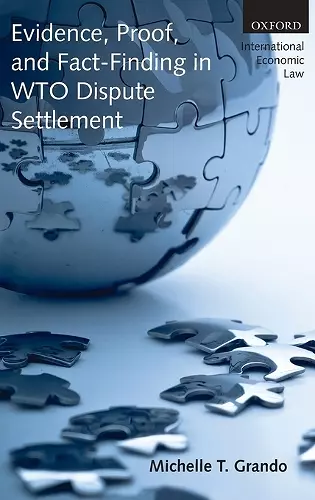Evidence, Proof, and Fact-Finding in WTO Dispute Settlement
Format:Hardback
Publisher:Oxford University Press
Published:24th Dec '09
Currently unavailable, and unfortunately no date known when it will be back

This book examines the process through which a World Trade Organization (WTO) dispute settlement panel formulates its conclusions with respect to the facts of a case, i.e. the process of fact-finding or process of proof. The Dispute Settlement Understanding provides general guidance but few direct answers to specific questions regarding the process of fact-finding, which has placed upon panels and the Appellate Body the responsibility to provide answers to those questions as they have arisen in the cases. This book reviews the extensive jurisprudence developed in the 14 years of operation of the WTO dispute settlement system with a view to (a) determining whether panels and the Appellate Body have set out optimal rules to govern the process of fact-finding and, to the extent that that is not the case, (b) to make suggestions for improvement. This book analyses questions such as (i) which party bears the responsibility of ultimately convincing the panel of the truth of a fact (burden of proof); (ii) what quantum of proof is necessary to convince the panel (standard of proof); (iii) the role of the panel, disputing parties, and non-disputing parties (e.g. experts, international organizations, private parties) in the development of the evidentiary record on which the panel bases its decision; (iv) the consequences of a party's failure to cooperate in the process of fact-finding; (v) how the parties can access the information which is necessary to prove their allegations; and (vi) the treatment of confidential business and governmental information. In assessing and making suggestions to improve the answers provided by panels to these questions, the book draws on the approaches followed in the two major legal systems of the world, the common law and the civil law, and to the extent possible the approaches adopted by other international courts and tribunals.
Grando writes with a fluid and clear style, and there are many useful summaries of key points and themes at the ends of chapters and elsewhere. There is a short but usable index. The book has been carefully edited; there are few of the glitches too frequently found in modern legal publishing. * James Crook, Transnational Dispute Management *
...one of the first books to present an in-depth analysis of various procedural issues related to evidence, proof, and fact-finding in WTO Dispute Settlement...One of the major qualities of this book is that the author is not only able to explain such very technical concepts, rendering them understandable also even to those who have never appeared in a domesdtic Court, but she also proposes solutions to address the problems identified that have the double merit of being in almost all cases the right ones while at the same time also pragmatic
...the central and most valuable aspect of this interesting text is the useful discussion of the theoretical issues of how fact-finding should be conducted and the burden of proof allocated. For this reason, the fact that the text is restricted to the WTO dispute settlement process should not inhibit the lawyer and legal scholar from including this book in their reading list * Stephen Mason, International and Comparative Law Quarterly *
The problems that are illustrated in this text apply across the globe, and will continue to exercise politicians internationally. * Stephen Mason, KLQ *
This is a fine book...Grando writes with a fluid and clear style, and there are many useful summaries of key points and themes at the ends of chapters and elsewhere. * Transnational Dispute Management *
ISBN: 9780199572649
Dimensions: 244mm x 161mm x 37mm
Weight: 817g
448 pages